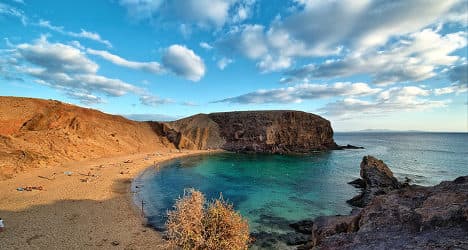'Canary oil spill risk is moderate': Repsol admits

Lanzarote's town hall is rallying public opposition against Repsol's plans to explore for oil 40 kilometres off the island’s coast after the Spanish multinational admitted there was a “moderate” risk of a spill.
Lanzarote’s administration has voiced its rejection of the energy company’s plans to begin drilling off the tourist island’s coast since a report published by Repsol itself outlined the “worst case scenario” consequences of the operation.
"The oil consortium recognizes one of the most important risks highlighted systematically by those opposed to the exploration project: the inherent threat of spills washing ashore onto the Canary Islands' beaches," Lanzarote Town Hall has said in a statement on their website.
Repsol have since talked down the whole affair and accused the island’s government of “trying to generate alarmism”, Spanish news agency Europa Press reported on Friday.
Even Spain’s Industry, Energy and Tourism minister, who is himself from the Canary Islands, has come out in support of Repsol’s plans, arguing it would have a similar effect to that of oil drilling on the Middle East’s tourism industry.
“It’s not only compatible, it could also boost tourism,” Jose Manuel Soria told a press conference last Thursday.
Repsol claims the two wells they have planned could yield as much as 100,000 barrels of oil per day and cater for ten percent of Spain’s hydrocarbon needs.
The energy multinational has also argued that the chance of a blowout is 1 in 50,000 and that it has adequate safety and prevention measures in place to prevent an environmental catastrophe.
The project has faced widespread condemnation since it was initially approved in 2001 and then annulled in 2004.
In 2012, the Spanish government authorized it yet again, arguing that it would help to ease the country’s dependence on crude oil imports, which account for 99 percent of total supplies.
The regional government of the Canaries responded by mounting a legal challenge against the drilling project as islanders still feared it could threaten the much-needed tourism industry.
Several thousand people took part in demonstrations in Lanzarote, Tenerife and Fuerteventura against Repsol's plans.
Greenpeace also issued a statement in which they denounced the “inherently dangerous” nature of deep sea explorations, citing the BP catastrophe in the Gulf of Mexico as an example and a warning.
5.8 million tourists have visited the Canary Islands so far this year, making it the second most popular destination in Spain after Catalonia.
Comments
See Also
Lanzarote’s administration has voiced its rejection of the energy company’s plans to begin drilling off the tourist island’s coast since a report published by Repsol itself outlined the “worst case scenario” consequences of the operation.
"The oil consortium recognizes one of the most important risks highlighted systematically by those opposed to the exploration project: the inherent threat of spills washing ashore onto the Canary Islands' beaches," Lanzarote Town Hall has said in a statement on their website.
Repsol have since talked down the whole affair and accused the island’s government of “trying to generate alarmism”, Spanish news agency Europa Press reported on Friday.
Even Spain’s Industry, Energy and Tourism minister, who is himself from the Canary Islands, has come out in support of Repsol’s plans, arguing it would have a similar effect to that of oil drilling on the Middle East’s tourism industry.
“It’s not only compatible, it could also boost tourism,” Jose Manuel Soria told a press conference last Thursday.
Repsol claims the two wells they have planned could yield as much as 100,000 barrels of oil per day and cater for ten percent of Spain’s hydrocarbon needs.
The energy multinational has also argued that the chance of a blowout is 1 in 50,000 and that it has adequate safety and prevention measures in place to prevent an environmental catastrophe.
The project has faced widespread condemnation since it was initially approved in 2001 and then annulled in 2004.
In 2012, the Spanish government authorized it yet again, arguing that it would help to ease the country’s dependence on crude oil imports, which account for 99 percent of total supplies.
The regional government of the Canaries responded by mounting a legal challenge against the drilling project as islanders still feared it could threaten the much-needed tourism industry.
Several thousand people took part in demonstrations in Lanzarote, Tenerife and Fuerteventura against Repsol's plans.
Greenpeace also issued a statement in which they denounced the “inherently dangerous” nature of deep sea explorations, citing the BP catastrophe in the Gulf of Mexico as an example and a warning.
5.8 million tourists have visited the Canary Islands so far this year, making it the second most popular destination in Spain after Catalonia.
Join the conversation in our comments section below. Share your own views and experience and if you have a question or suggestion for our journalists then email us at [email protected].
Please keep comments civil, constructive and on topic – and make sure to read our terms of use before getting involved.
Please log in here to leave a comment.